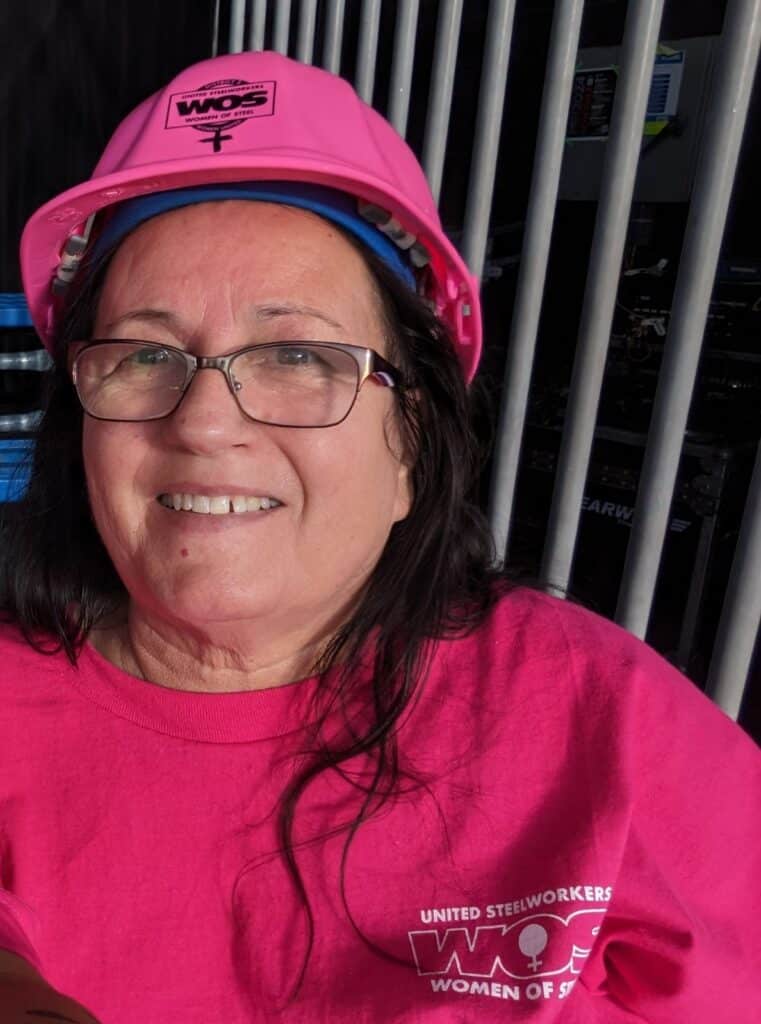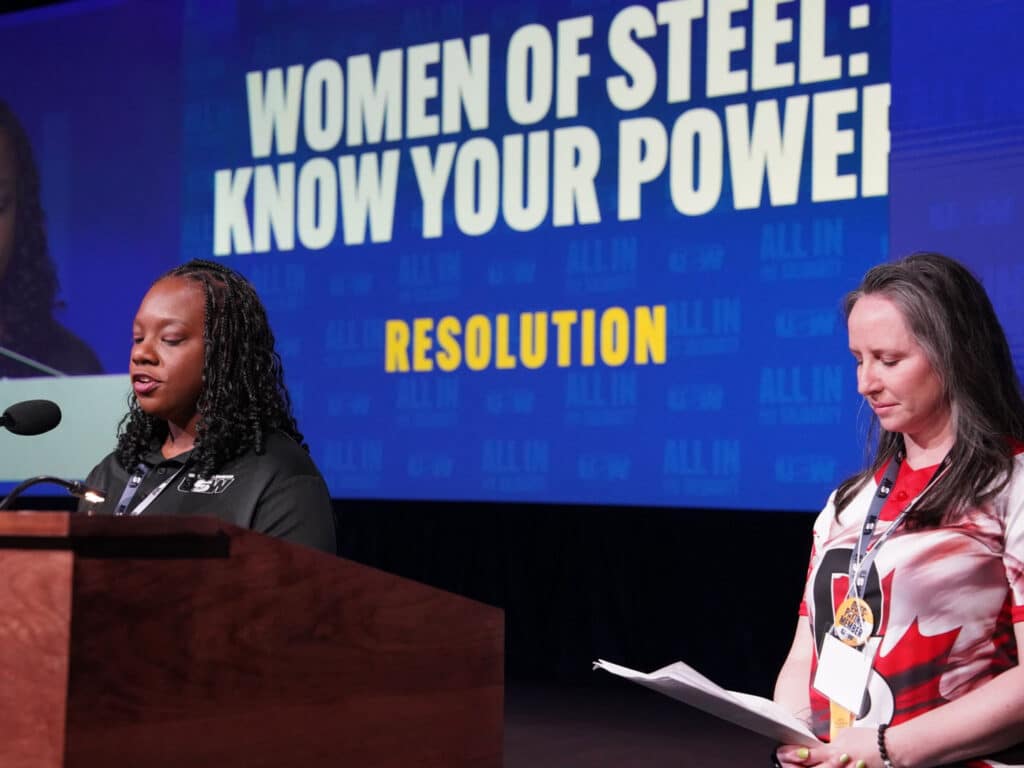Raising the Bar; Members Push for Women’s Health, Safety Protections in Contracts

USW leaders celebrated Women’s History Month in March by reaffirming their commitment to fighting to improve the health and safety of all women.
Long before the union made that pledge, however, members had already begun stepping up their efforts to fight for protections for women—at the bargaining table, in the halls of government, and beyond.
“As a union, we will continue the fight for true gender equity and affirm our commitment not simply to equal pay for equal work but also for comprehensive health and safety for all workers,” International President Tom Conway said marking International Women’s Day on March 8.
Domestic Violence
A big part of that fight for equality has been the effort to negotiate language into collective bargaining agreements to ensure protections for workers experiencing domestic violence.
Some of the key components of that push include proposals to guarantee paid leave as well as additional unpaid leave for members who are experiencing domestic violence, protection from discipline for survivors, and employer commitments to safety planning and training for peer advocates.

“Our plan is to propose the same consistent language at the table moving forward,” said International Vice President Leeann Foster, who oversees more than 550 locals and 30 councils in the union’s paper sector as well as the Women of Steel program. “Expanding this beyond the paper sector is also a top priority, and we encourage locals to work with their staff representatives to secure these protections for their workplaces.”
USW bargaining committees fought for and won language on domestic violence leave in recent contracts covering tens of thousands of members in steel, paper, tire and rubber, health care and other major sectors. Foster helped workers at major paper companies, including Packaging Corp of America, Domtar, International Paper, Essity and others, secure language on domestic violence leave in their recent agreements.
Addressing the issue of domestic violence through collective bargaining agreements was one part of the USW’s “Action Guide for Raising the Bar on Women’s Health and Safety,” a 40-page guide initially developed by the union’s Women of Steel program and the USW’s Canadian office, and later adapted for use by local unions in the United States.
The guide, Foster said, is intended to give members the tools they need to better address members’ health and safety concerns.
“Using the union’s collective voice and harnessing the solidarity of the membership are the best ways to bring these topics to the forefront,” Foster said. “Through bargaining, we can push for the buy-in we need from management and ensure that these protections are in place for future generations of workers.”
Range of Issues
In addition to addressing the need for leave for workers experiencing intimate partner abuse, the guide provides tools members can use to address other issues, including harassment, gender identity, ergonomics, work-life balance, restrooms and change rooms, uniforms, personal protective equipment, and reproductive health. Members can find the guide at: usw.to/raisingthebar.
“It’s important that we make sure that management at our workplaces views all of these issues through a woman’s lens,” Foster said. “This guide gives USW members the tools they need to address a wide range of women’s health and safety concerns.”

Unlike some other workplace issues, the problem of domestic violence is at times invisible even to those closest to the victims. Yet it is clearly an epidemic; hotlines in the United States receive, on average, more than 20,000 phone calls per day, according to statistics from the National Coalition against Domestic Violence.
About one in four women and 14 percent of men in the United States have experienced physical violence from their partner.
Time Off Crucial
Longtime USW member Mayson Fulk experienced domestic violence after moving to Canada with his then partner. He was able to find his way out of that volatile situation, only to find himself in another abusive relationship shortly thereafter.
Fulk said he experienced attendance issues at work as a result.
“When you’re up all-night fighting, you don’t want to be at work the next day,” Fulk said. “It takes a toll on your mental health. One particular time we got in a physical altercation, and I had to take three days off work because I didn’t want to have to explain the black eye.”
Union-negotiated domestic violence leave can help to fulfill that need. The language can provide paid or unpaid time off for court appearances, relocation, counseling and more, enabling survivors to attend to pressing obligations without expending vacation or sick days.
USW Women of Steel leader Teresa Cassady counts herself lucky that, when she experienced domestic violence, she had an understanding boss at her workplace who helped her.
“Had my supervisor not heard, or cared, I don’t know what I would have done,” said Cassady, who now serves as assistant director of District 1. A video of Cassady’s harrowing story, which members have used in bargaining to introduce domestic violence language, can be found on the USW YouTube channel: youtube.com/steelworkers.
Contract Language
Having strong contract language means that members don’t have to hope that they have a boss, as Cassady did, who is sympathetic to their situation.
During their most recent rounds of bargaining in the steel industry this past summer, USW members fought to enshrine domestic violence leave language in the union’s contracts with the top two steelmakers in the United States—Cleveland Cliffs and U.S. Steel.
International Vice President Dave McCall, who chairs several of the USW’s major bargaining committees, including those at Cleveland-Cliffs, ATI and Goodyear, said the union’s job of protecting members should not end at the workplace gates.
“The job of any union is to recognize the needs of workers and their families and do what we can to help them meet those needs,” McCall said. “Ensuring the safety and security of workers and families is something we should be fighting for every day, in our workplaces and in our communities.”

Emily Brannon of Local 310L in Des Moines, Iowa, lost two co-workers to domestic violence over a three-year span, leaving her and other members reeling.
Their grief put them on a quest to save others by bargaining paid domestic violence leave into their contract with Bridgestone-Firestone.
“I think it shows that we’re sensitive to the issues of our members,” explained Brannon, treasurer of Local 310L and a member of the local’s Women of Steel committee, who knew both of the members fatally shot by their abusers between 2014 and 2017. “We have a very diverse workforce and membership, and there are a variety of issues outside of work that members may be dealing with.”
The last thing workers experiencing domestic violence should have to worry about is losing their job as a result of the abuse, Foster said. She said that USW activism on the issue has helped to open employers’ eyes to the need for contract language to address it.
“Once we bring it to employers’ attention, they really see the value of making sure that there’s a policy in place so that anyone who’s encountering this issue in their life can bring that forward to management and it’s dealt with confidentially,” Foster said. “I’ve been so proud of our brothers and sisters because this language is being brought to the table across the U.S. and Canada.”
By clicking Sign Up you're confirming that you agree with our Terms and Conditions.
Recent News Articles
Want to Learn More?
See how the USW is making a real difference in our communities and our workplaces.

